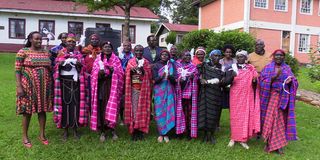15 FGM perpetrators ‘discard knives,’ apologise for ruining young lives

Reformed FGM perpetrators speak to the press in Kapenguria on November 15, 2023.
What you need to know:
- The women say the suffering they have caused is evidenced by high school dropout rates that see many girls fail to pursue their dreams.
- They have pledged to champion campaigns against female genital mutilation, an aged-old practice by the community.
- Each reformed circumciser has got two she-goats to rear the Pokot Outreach Ministries as an alternative source of income even as they called for more support.
The fight against female genital mutilation is bearing fruit after 15 circumcisers joined campaigns against the harmful practice among the Pokot.
The women have sought forgiveness, saying the suffering they caused is evidenced by high school dropout rates that see many girls fail to pursue their dreams. They have pledged to champion campaigns against female genital mutilation (FGM), an aged-old practice by the community.
At a press conference in Kapenguria on Saturday, the reformed circumcisers, led by Mezania Chepurai Lokudo from Tamugh village in the Sook area, said they quit after being educated on the dangers of the vice and trained by Pokot Outreach Ministries (Pom). They were drawn from Sook, Nyarkulian, Mortome, Kamelei, Kasei, Lopet, Cheptuya and Kolowa of West Pokot and Tiaty in Baringo.
“We used to cut girls thinking we were doing the right thing, but we surrendered. We have thrown away the knives. We say no to all the vices,” Ms Chupurai said.
She said their children missed out on education because of the retrogressive practice. “Our hands sinned and that affected our girls. These girls’ thinking capacity went down after the cut. We thought we were making them bright but spoiled them instead.”
Ms Chepurai said they will embark on sensitizing residents of West Pokot, Baringo and neighbouring Uganda. “Many cutters are on their way to joining us in the fight. My Mafuta Pole church made us start saying ‘no’ to the knife.”
Zipporah Kasoket from Kolowa, Baringo, said they opted out after facing many challenges. “The cut has spoilt our girls; they are not in school. Many were dropping out and getting married off in exchange for livestock as [reverse] dowry. Elders have been insisting on getting dowry,” she said.

Reformed FGM perpetrators speak to the press in Kapenguria on November 15, 2023.
Ms Kasoket noted that many girls who undergo FGM engage in illicit liquor brewing and become drunkards after being chased away by their husbands, who fail to feed them. She expressed concern that some become sex workers after their marriages fail. “We want to see our girls with big jobs in big offices.”
Pom director Reuben Meriakol raised concern that some chiefs are bribed to abet FGM. He called on leaders and other stakeholders to support efforts geared towards ending the practice, cooperate and be extra serious. “Our leaders have not been serious enough. There is no justice to our girls if FGM is on. We need a collective responsibility and we should not work in isolation.”
He said the organisation has given the reformed circumcisers two she-goats each to rear as an alternative means of income. He said empowering them through alternative livelihoods prevent them from going back to the illegal trade.
Ms Chupurai called for more support from the national and county governments, as well as well-wishers, to help them cope, saying some of them would easily do business if they got capital.
Mr Meriakol urged the community to shun retrogressive practices, including child marriage, which hinder development, and appealed to parents to invest in girls’ education and stop subjecting their daughters to circumcision.
“We have alternative rites of passage in December and January next year; we shall have zero tolerance programmes,” he said.
The Kenya Demographic and Health Survey 2022 report shows that FGM has reduced in the country from 38 per cent in 1998 to 15 per cent in 2022. West Pokot County has a prevalence of 74 per cent.





